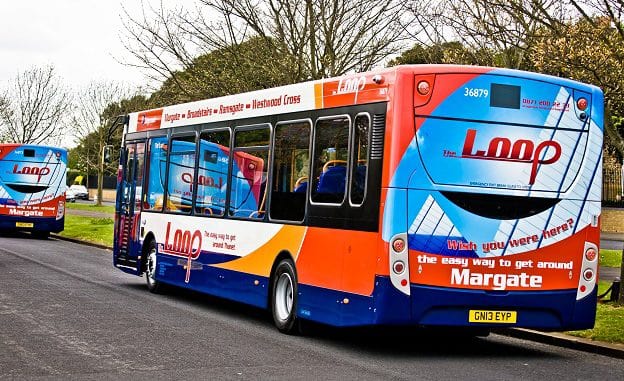
Details of five pilot schemes for changes to rural bus services will be announced at a ‘summit’ next week.
The invitation-only meeting follows the ‘Big Conversation’ consultation earlier this year exploring options for delivering more sustainable transport to rural communities not currently served by commercial operators.
During the consultation three alternative plans for public transport were put forward in the face of impending cuts to bus services subsidised by Kent County Council.
The services are those that don’t have enough passengers to make a commercial return but are considered necessary for those living in rural areas. Kent County Council has been funding the services but says there is not enough money in its budget to continue doing so
Options
- Replacing the subsidised bus service with a small bus or taxi that would be used to connect people living in rural areas with an existing commercial bus service. A small minibus would pick up passengers from villages and connect with bus maybe four times a day and do the same for the return journey. These services would run at fixed times. They would pick up and drop off passengers at fixed stops along the route. Passengers could wait on the feeder minibus or taxi for their connecting bus to arrive. Passengers could buy a ticket for the whole journey (feeder service and existing bus).
- A bookable bus service would collect passengers from chosen points and take them to a range of places in a set area. This could be from a pick up point or from the passenger’s home. Passengers would make a booking by telephone or on the internet. They would say where they want to go and would be told when they could be picked up for their journey. Bookings could be made 7 days, 1 day or hours before the journey. Journeys would be shared with other passengers to make them as efficient as possible. Passengers would need to be flexible with the time and length of their journey. Passengers would need to allow more time to travel to fixed time appointments e.g. doctor’s appointment.
- There could be a taxi-bus service using a smaller vehicle, such as 7-seater car or minibus. The taxi-bus would run at fixed times and to a fixed route. It would stop at fixed stops along the route. This would not be on a fixed route so can provide more journey opportunities however journeys could take longer. Passengers would need to book in advance. The amount passengers pay for their journey depends on where they are going (just like an existing bus).
The options would mean passengers paying for their route – bus passes would not be valid for minibus/taxi services.
The Big Conversation consultation ran for eight weeks up until August 8 and included 12 public meetings in each Kent district.
The events were attended by 621 people and KCC received 2,335 responses to the consultation questionnaire.
The summit will include details of consultation responses, details of five pilot schemes and how they were developed and what the next steps will be.
The event on Tuesday, October 30 at County Hall runs from 6pm to 8pm. It is by invite meaning people cannot attend by just turning up but it will be webcast on www.kent.gov.uk

